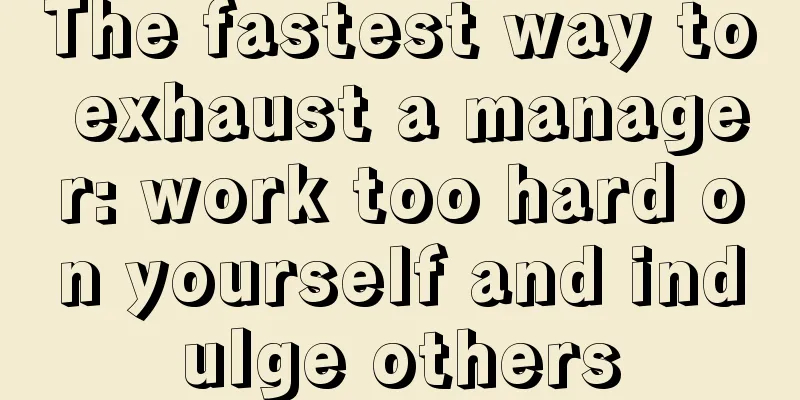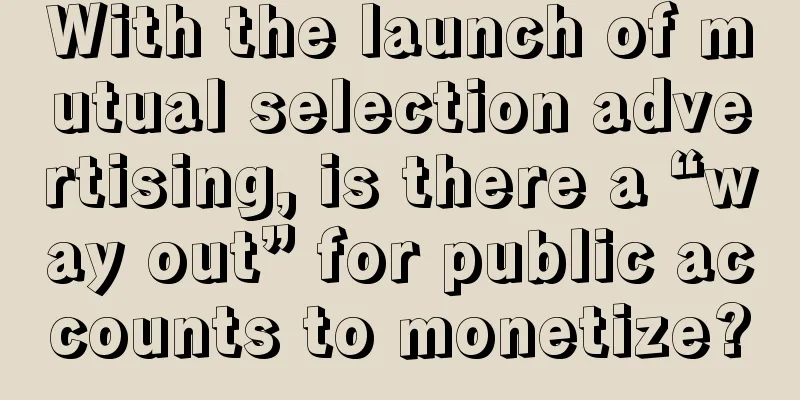The fastest way to exhaust a manager: work too hard on yourself and indulge others

As a manager, you will always face such doubts: you always feel that you are more efficient and controllable by doing things yourself rather than directing others to do them. You worry that your decisions will be questioned, or that your subordinates’ abilities and influence will surpass yours. Some employees’ sense of responsibility and performance are not satisfactory, but you have to rely on them. The reason for these doubts is essentially because you have not yet made the transition to a better identity and your mind is still stuck in your own world. The transition from an individual contributor to a team manager is a critical step in your career. Only by making the leap from getting results yourself to relying on a team to get results, can you become proficient in management. 1. Self-leap: from ego satisfaction to greater self achievementYou are discussing a problem with your boss. The conversation was going well, but when you put forward a different point of view, your boss's face suddenly turned ugly. He is a very friendly person who sometimes jokes with his subordinates, but now he tries every means to suppress you, saying that you don't know the overall situation, and then tries every means to prove that he is right. You wonder why your boss has become so stubborn. Is your opinion wrong? No, your opinion may make sense, and he may even agree with it. But he would not show that he agreed, because he had no way of admitting that he was wrong in front of his subordinates. I call this: instant stubbornness. Proving that he is right is more important than whether the thing itself is right or wrong. Sometimes we are not fighting to win, but to win the debate. Why is this so? Because the ego in his heart is too small but too powerful. In fact, you also have this problem. 1. Understand your boundariesWhat is the self? Fu Sheng once defined the self as follows: ego is a very emotional thing that will establish a psychological defense mechanism for you. Because you don’t like the feeling of making mistakes, your instinct is to always want to force an argument, and you get angry when others criticize you. Because you are afraid of facing complex things, you always want to simplify the problem. Your starting point is not to face reality, but to be full of “me, me, me, me” - this is the obstacle of ego. At the beginning, the child has no concept of self. He thinks that he and the world are symbiotic and that his mother is a part of him. Therefore, he feels sad and wants to cry when his mother leaves. After looking in the mirror, we have a preliminary concept of self. When we grow up and become independent, we have a clear self. We can clearly distinguish between mine and yours. But after becoming a parent, the scope of self will expand, and children will become an extension of self. If your colleague does better than you, you may feel a little jealous because he or she is outside your self-boundaries. But if your child does better than you, will you be jealous? You won't. You will even be happier because your child does better than you, because your child has entered the boundaries of the self, and his good performance means that your greater self has done well. A person's growth is a process from having no self-boundaries to forming self-boundaries and then extending self-boundaries. The larger the self-boundaries, the greater things one can accomplish. When a person first enters the workplace, he is still young and has not received any training. His self-boundaries will be very small and confined to a small personal scope. The boundaries of the ego are small but very powerful. Why? Because once the self-cognition is inconsistent, people will suffer psychological trauma, so they must have a very strong ego to protect themselves from being hurt. When you are an employee, it is OK to have a ego. But when you move from an employee to a manager, there are problems. You will constantly face challenges about yourself, and you will have three important fears:
Why are you so afraid? The self in you needs a sense of security, belonging, accomplishment, and self-realization. Once your subordinates prove that you are wrong, prove that they are better than you, and prove that they have more influence than you, all these needs of your self will be damaged. Therefore, once you become a manager from an employee, if your self is still limited to yourself, which we call "ego", it will be difficult for you to face the relationship with your employees. At this point, you must make a major leap, otherwise it will be difficult to lead the troops. You need to expand your own boundaries to include the entire team. This is a very difficult, but extremely important leap. 2. Expand your boundariesRegarding this leap, let me tell you a story about my writing of “30 Lectures on Business Insight”. At that time, I had completed two seasons of Liu Run 5-Minute Business School, totaling more than 600 lectures. In terms of the number of articles, it was 20 times that of Business Insight, so I should be considered an experienced writer. Moreover, I have very high requirements for my writing. I put a lot of thought into the cases, the beginning, development, transition, and ending, the emotions, the matching of long and short sentences, punctuation, paragraphing, the progression, and even whether to use "push" or "knock". So, I write very slowly. I write and then delete, and then revise. The first draft of more than 4,000 words is polished into an article of more than 2,000 words and handed over to the editor. Then, I got feedback from the editorial team: "This article is great, it's perfect, but if I have to nitpick, here are the 99 points. Please revise them." If it was before I was 30, I would have immediately been angry: Do you understand the foreshadowing I set? Do you know the emotion I expressed in this way? Do you know the 30 reasons why I chose this one after choosing between 5 logical lines? Before I was 30, I would have replied, "Please don't touch my words." But, did I really reply like this because I thought this expression was perfect? Actually, it wasn’t. At least not completely. I said this with emotion, and now I think it was because of the “Ego” in my heart. I don't accept others saying I'm wrong. I won't accept myself thinking I'm wrong. I can't accept that something I spent so much time writing is still considered wrong. This is doubting my IQ and my ability. Who are you? Why do you think you can do that? But now, I really don't have this emotion at all. I seem to be floating in the air, watching a person named "Liu Run" reading the editor's suggestions. I have no emotion at all in the air. In my mind, Liu Run is "he" rather than "me". I calmly understand the editor's suggestions, guess his thinking path when making the suggestions, and even can't help laughing at the scene of their heated discussions in the conference room. Then, as an observer, I told Liu Run: Some of these suggestions are very reasonable and can be changed immediately; some are just the editor’s personal habits and can be left unchanged or changed. Liu Run asked: Should we change it? I would smile and tell Liu Run: Go ahead, change it. It doesn’t matter whether you change it or not, it’s just a matter of habit, but if you change it, it will motivate the editor and make him feel that his suggestion is valuable and accepted. Although you spend more time, you will receive more good advice and make the course better. From October 2018 to May 2019, I was very diligent and used all my time when I was not on business trips to work hard on myself. It took me seven or eight months to rewrite 30 lessons five times. It took me longer than the 150 lessons I took in half a year. Finally, I looked through the writings of "Liu Run". The 5th edition is indeed very different from the 1st edition. You see, at this time, I am not "I", I am "he". I also had this feeling when my friends helped me organize the articles for my public account. The texts organized by my friends may need to be revised before they can be published. Some of my friends immediately refused to do it and were very upset; some of them calmly explained why they couldn't change it, and then quietly changed it back. There are certainly reasons behind these "reluctance to change", but in fact, many of them are just because of the emotion of "ego": changing my text offends the "self" in my heart. I share these insights with you. This state of "not living in my own heart", where I am not "I" but "he", where there is no self in my heart but only the goal, is very difficult to cultivate. This is why the ancients said, "At 60, one's ears become obedient." Why do you have to wait until you are 60 to become obedient and not jump up? Because you need to spend 20 years to build up your "self" and then spend another 40 years to defeat your "self." I wish everyone can overcome themselves as soon as possible and “observe themselves” without having to wait until they are 60 years old to be able to hear things clearly. 3. Improve overall efficiencySo how do you expand your boundaries and make this most difficult leap? Managers need to know how to focus on overall efficiency, which means focusing on the bigger picture. The first step is to move from the individual level of self to the parent level of self. You treat those employees as your children, you will watch them grow and hope that they will surpass you. Parents' sense of accomplishment comes from the size of their children's achievements, so managers should train themselves with the mentality of parents. The second step is to move from the parent-level self to the king-level self. The king's mentality is that a country is strong only when its people are rich, and a country is rich only when its people are safe. When one day you transform from a professional manager or a team manager into a real entrepreneur, you will need a king's mentality. What is the parent mentality and the king mentality? It is when everyone in the team is doing an outstanding job, I am the one behind everyone. We used to say "family, country and the world". From the individual to the parents, it becomes the mind of managing the family; from parents to the king, it becomes the mind of governing the country and pacifying the world. When we talk about a person's pattern, mind, and bearing, we are referring to how much this person has expanded into his or her self. If this has expanded into the entire country, the entire earth, or even the entire universe, his or her pattern will be completely different. A manager's success depends on the success of the team. At this time, he must at least take the first step and expand his own boundaries outward to include all his subordinates. Their success is your success; their happiness is your happiness. Only then can you truly accomplish great things and be better prepared to grow into a CEO in the future. The ego is a very emotional thing, and it will build up a psychological defense mechanism for you. An important problem that many employees encounter when they are promoted to managers is that the self in their hearts is an "ego", just like a pine nut, which has a hard shell but is very small and can only accommodate themselves. After becoming a manager, you must become a larger container that can accommodate all your subordinates, otherwise you will not be able to focus on overall efficiency. How to improve? Find two role models: parents and kings. Managers should learn from them and change from pursuing the satisfaction of the small self to pursuing the achievement of the big self - the team and the company. 2. Communication Leap: From Using Your Hands to Using Others’ BrainsWhen we expand our own boundaries, we also need to get results together with team members. However, when we communicate tasks with employees, the following scenarios often occur: The manager asked:
A few days later the manager asked:
The employee asked a few questions and started to work. After finishing, the manager found that the employee did not do what he imagined. So he asked:
As a result, Xiao Zhang found that he didn't quite understand his intentions. At this time, the manager will have a strong sense of powerlessness, like punching cotton. Employees do not do things according to his intentions, and when the task time comes, there is no result he wants. It’s just like Karen Mok’s song: You don’t listen when you talk, you don’t understand when you listen, you can’t do when you understand, and you can’t do it well when you do. He felt that he had lost control of the entire team, and the resulting anxiety drove him crazy. He had a strong desire to keep control firmly in his own hands. After being promoted to manager, communication becomes important because we are moving from "lossless communication" to "lossy communication". In the past, you could complete the tasks yourself, but now you have to let your employees complete them. The communication mechanism has changed, which is a major leap. 1. From "lossless communication" to "lossy communication"To understand what "lossy communication" is, we must first understand what "lossless communication" is. When we were still employees, we communicated with ourselves, our brains and our hands, our hearts, eyes and hands were all connected, and we could do whatever we thought of. This is called "lossless communication", why? Please imagine a scenario: what would happen if you go to get a cup of coffee by yourself? You have a thought, I want to drink coffee, then you pick up a coffee cup with your hand, put the cup to your mouth, and then take a sip. The whole process is as smooth as flowing water, simple and natural. If you break it down carefully, you will find that there is a lot of communication involved. There are two core communication steps: thoughts and behaviors. First, your brain wants your hand to take the coffee. Your idea is lossless information transmission with 100% completeness. Second, after your hand receives the information, it takes action immediately. If the brain wants to drink warm coffee, it will wait for the coffee to cool down before bringing it to your mouth. The hand's acceptance of the brain's instructions is 100%. You are both a decision maker and an executor, so the ideas you convey are 100% complete and your actions are 100% accepted. The communication efficiency is extremely high, but you just didn’t realize it before. But the situation is different now. After becoming a team manager, you are the decision maker and your employees are the executors. Problems arise when decision-making and execution are separated. We must know that when our brain no longer controls our hands, and then controls other people's hands, there are two more intermediaries in the communication process. The first intermediary is your mouth, through which the information in your brain is transmitted. The second intermediary is the employee’s brain, which receives the information and then transmits it to the hands. The two intermediaries cause two problems. The first problem is that when your mouth transmits information, it causes information loss, and the integrity is not 100%. The second question is whether the employees truly agree with your instructions after receiving the information. In reality, there is often a loss of acceptance, and it is not 100%. The two communication intermediaries, the manager's mouth and the employee's brain, cause huge losses. This is the root cause of communication difficulties for team managers. The two communication intermediaries, the manager's mouth and the employee's brain, cause huge losses. This is the root cause of communication difficulties for team managers. Therefore, the second leap from an employee to a manager is: from the unnecessary skills of "lossless communication" to the superb skills of "lossy communication". So what should we do? 2. Four communication skills of expertsFirst, don’t say “this is not possible”, but say “if…then…” I used to have a boss who was the vice president of Microsoft Greater China and one of the two partners. He could share the profits of Greater China. I respect him very much, and he also admires me, so we often chat together. One time he told me the "if...then..." speech. He said his former boss was the CEO of HP and had run for the US presidency. Whenever he talked to his boss about something, he never said, "You are not doing this right." Instead, he would say, "Oh, that's great. If you can add this, this thing will have a better chance of being realized." His boss does not deny others, but communicates with people from a constructive perspective. If you are short of a brick, I will give you a brick, if you are short of a piece of wood, I will give you a piece of wood. "If... then...", after "if", is what he adds. Second, don’t say “but”, say “yes…and…” Don't say "but", but say "you are right, and it would be better if you could do something else". Just like "if...then...", you never deny the employee and at the same time add better suggestions. Once, several of us went to attend a workshop by Goldsmith, the world’s top CEO coach, and learned this technique. He said, today we will put a box in front, and no one is allowed to say the word "but". Once you say "but", you have to put ten dollars in the box. In the subsequent communication process, we often say "I agree with your point of view, but..." When Goldsmith heard this, he asked him to give him ten dollars. Everyone was very careful later, but they still said "but" from time to time and kept taking out ten dollars. This shocked everyone. Even though they are people who pay great attention to communication, there are still countless "buts". Goldsmith said, why can't you say "but"? Once you say "but", you are standing on the opposite side of the other party. When you and the other party are on the same side, it is more conducive to reaching consensus and communication. Therefore, try to reduce the use of "but" and "however" in your language and instead say "at the same time" and "and". For example, if you disagree with the other person's point of view and you have your own point of view, you can say, "Yes, you think so, and I think this way." You didn't say "but", you said "yes...and..." Third, “Do you feel that way?” This technique was taught to me by Mr. Luo Zhenyu. Luo Zhenyu used to work at CCTV and often had to interview many people. Most of the people interviewed had no training in expression and often spoke a lot in one breath. Luo Zhenyu can't say that others are long-winded. After listening, he will say, "Let me summarize it for you. Do you think so?" Then he will tell the first point, the second point, and the third point. His summary is usually clearer, and the other party will say, "Yes, yes, that's what I think." That's great, I will organize the text according to these three points. "Do you think so?" At this time, the person will regard the content you have organized as his own opinion, and his acceptance level will be greatly improved. Fourth, “I know you mean well.” This is a method I summarized myself. When you communicate with your subordinates, sometimes they are resistant, sometimes they just want to embarrass you, and sometimes they just want to prove that they are capable and have different opinions from you. At this time, you must not confront him face to face, saying "I've been so good to you, why are you hurting me?" This will cause you to quarrel. Doing so may stop him from doing harm to you, but you will also gain an enemy. Because no one would think of himself as the "bad guy". Even if he did something bad, he would have found a reason for it. If you expose him, he would instinctively start from his inner cognition and protect his own motives, and he would start to hold a grudge. Therefore, we cannot attack the other party's "motives". We can communicate like this: I noticed that you did something recently (describe the behavior), and I know you did it out of good intentions (affirm your motives). I saw it, but you kept it from me. I am very grateful. Thank you. Although this kindness did not really work, and even had some negative effects on me, I am still very grateful (express kindness). It would be even better if you could do that (give suggestions). If you keep insisting, the other person will also think: he did this out of kindness and he is a good person (this is very important). His cognition has changed, and then, also for the reason of cognitive coordination, he will modify his behavior so that what he does is consistent with the motivation of kindness. 3. ConclusionWhether it is from an employee to a manager or from a manager to a CEO, any change in identity must inevitably go through a key leap. Only by leaping forward in all directions can one truly be reborn and remain calm. |
<<: There is traffic but no conversion? How to write high-conversion notes on Xiaohongshu?
Recommend
Is Amazon related because of a single factor? Why is it related?
On the Amazon platform, both consumers and merchan...
MINISO's 3.88 yuan blind bag backstabbed the working people
MINISO recently launched a 3.88 yuan blind bag, wh...
Efficiently hold brand creative meetings
How should a brand creative meeting be held? How c...
What categories does eBay offer? Which categories are more popular?
eBay is one of the world's most famous e-comme...
WeChat Stores Tried MCN for Only One Month
As WeChat Stores continue to launch new policies t...
Do Shopee cross-border stores require deposits? Detailed answer
We all know that you don’t need to pay a deposit t...
What are the three Amazon ad bidding strategies? How to calculate?
Many friends on Amazon will also try to promote. A...
Meituan’s short drama is launched on Douyin, is the local life war coming to an end?
The competition and cooperation between Meituan an...
In 2023, there will be no top streamers on the Internet
In 2023, new Internet celebrities are emerging fre...
Xiaohongshu, Bilibili, Kuaishou, Internet platforms set off a new wave of "poetry revival"
Poetry, which was marginalized after the 1990s, is...
How to set up Shopee review rewards? How to manage them?
Some users who buy things on Shopee don’t have the...
Wang Ma’s “crash” caused public ridicule. How long can “Working People” continue to rely on traffic?
This article deeply analyzes the double "coll...
Xiaomi SU7 is a hot seller, why do people think it is great value for money?
This article explores an important strategy in pro...
How to do foreign trade? What are the models?
With the introduction of the epidemic, many friend...
Is shopping on Amazon China reliable? Are all products genuine?
As people's economic ability improves, many pe...









